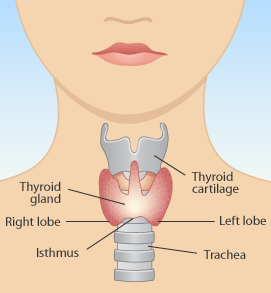Could Your Thyroid be the Cause of Excessive Hair?
Many women don’t know the reason behind their excessive hair growth. Most do not discuss the matter with their doctors since they might attribute it to changes in stress or genetics. Thyroid function could play an essential role in excessive hair growth in women. Some men also deal with excessive hair, but we will discuss female hair and thyroid function in this article.
It is normal for women to have hair on their arms, underarms, bikini area, and legs, and it is even common for women to have a bit of lighter hair (peach fuzz) from head to toe. When dark or thick hair grows in other areas, like the face or chest, it could be a sign of hirsutism. This can be a very embarrassing topic to talk about.
“The effect that excess hair can have on a woman’s self-esteem and how she views herself as a woman – and therefore her quality of life – can be extremely distressing,” says Rachel Hawkes, chairwoman of Verity, a polycystic ovary syndrome charity. If you have unwanted hair that may be attributed to a hormonal issue, please know you are not alone. Up to 15% of all women have excess hair.
Thyroid Function and Excessive Hair Growth
This excessive hair growth in women could be your body’s way of getting you to pay attention to a thyroid issue going on. The thyroid is a hormone-producing gland that monitors the body’s energy, oxygen, and heat production. The pituitary gland manages it, and hyperthyroidism is ten times more common in men than in women. It typically occurs between the ages of 20 and 40. An overactive pituitary gland can also cause additional hair growth.
 There are various treatments that a physician can suggest to help with a thyroid or hormonal issue. Some may include radioactive iodine and anti-thyroid medicine, which can help some people feel better within a few weeks. Thyroid treatments will not eliminate hair that has already surfaced, but they could help to prevent further hair from growing. Once a thyroid problem is addressed, it is unlikely for new hairs to sprout up in unwanted locations.
There are various treatments that a physician can suggest to help with a thyroid or hormonal issue. Some may include radioactive iodine and anti-thyroid medicine, which can help some people feel better within a few weeks. Thyroid treatments will not eliminate hair that has already surfaced, but they could help to prevent further hair from growing. Once a thyroid problem is addressed, it is unlikely for new hairs to sprout up in unwanted locations.
Temporary vs. Permanent Hair Removal Solutions
While tweezing, shaving, waxing, threading, creams, bleaching, or laser may seem appealing in the short term, none are permanent. These are time-consuming, costly, and will not produce the best results. Just because these treatments are popular does not mean they are effective. The hair will most often grow back soon after treatments are completed. Electrolysis is the only FDA-approved permanent hair removal treatment that will work with any hair type or color. It works by placing a fine needle into a single hair follicle and employing a slight electrical current, which destroys the hair growth cells. All the abovementioned treatments, including electrolysis, will not eliminate or prevent an underlying hormonal issue.
Seeking Medical Advice and Professional Hair Removal
If you have a medical issue, we suggest you contact your physician to learn more about your health situation and possible treatment options. In the meantime, Top Electrolysis NYC offers a free consultation, during which we can listen to your hair-related goals and develop a plan that works for you. Book an appointment today to learn more!
Hashimoto’s and Hair Growth
Have you ever questioned the presence of unwanted hair in specific areas? If you’ve noticed hair-related anomalies like unusual loss, bald spots, patchiness, or clumps falling out, alongside unexplained weight gain despite no change in diet, pale and dry skin, persistent fatigue, and a constant feeling of coldness, in contrast, others are cozy, and Hashimoto might be the culprit.
So, what is Hashimoto’s all about?
Hashimoto’s is the most common cause of hypothyroidism, an underactive thyroid gland. The thyroid, a small gland situated in front of the neck, produces thyroid hormones that control how the body uses energy.
In Hashimoto’s disease, the immune system produces antibodies that attack and damage the thyroid glands, hindering their ability to produce adequate hormones. Prolonged hypothyroidism and hyperthyroidism can lead to hair loss, affecting the entire scalp rather than specific areas.
Various therapies recommended by a physician might help address thyroid or hormonal issues. While anti-thyroid medications won’t remove existing hair, they may prevent new unwanted body or facial hair from sprouting. Electrolysis, the only FDA-approved hair removal technique effective for any type or color, can also be a treatment option for Hashimoto’s disease in NYC.
Conclusion: Find the Right Solution for You
Are you struggling with excessive hair growth in women and looking for a permanent solution? At Limoges Beauty, we specialize in electrolysis permanent hair removal, the only FDA-approved method for permanent hair removal that works for all hair types and colors. Don’t let unwanted hair affect your confidence and quality of life. Contact us today to schedule your free consultation and take the first step towards smooth, hair-free skin. Book your appointment now, and let us help you achieve your hair removal goals!
Resources:
Excess hair may be a sign of health problems in women
Thyroid symptoms

